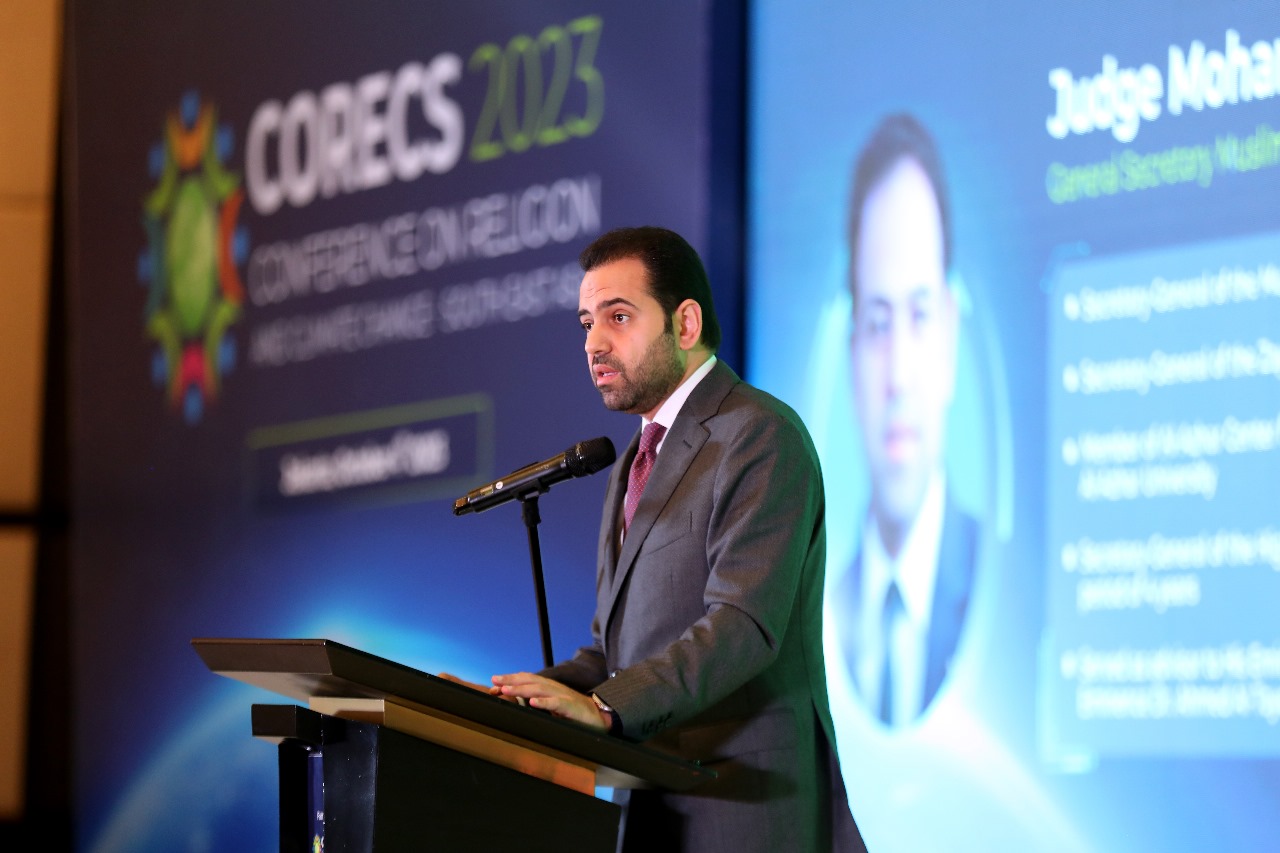Intensive Activity by External Branches of the Muslim Council of Elders in 2023 by Building Bridges of Communication and Enhancing Mutual Coexistence
Intensive Activity by External Branches of the Muslim Council of Elders in 2023 by Building Bridges of Communication and Enhancing Mutual Coexistence
Opening Two New Branches of the Muslim Council of Elders in Indonesia and Kazakhstan During 2023
The External Branches of the Muslim Council of Elders in 2023: Bridges for Communication and Dissemination of the Values of Dialogue and Coexistence
In 2023, the external branches of the Muslim Council of Elders witnessed intensive activities in Malaysia, Indonesia, Pakistan, and Kazakhstan. Numerous events and activities were organized with the aim of promoting peace and spreading the values of dialogue, tolerance, and mutual coexistence, while simultaneously building bridges of communication with Muslims worldwide.
In October 2023, the Muslim Council of Elders inaugurated its regional branch in Southeast Asia, headquartered in Jakarta, Indonesia. This move was warmly welcomed and praised by President Joko Widodo of Indonesia and wider Muslim communities in Southeast Asia. The branch is expected to work towards achieving the Council's goals in promoting the values of tolerance, coexistence, and communication with Muslim communities in the Southeast Asia region.
The branch in Indonesia organized the 'Religions and Climate Change' Summit, which was attended by approximately 150 prominent religious leaders, academics, environmentalists, and officials from Indonesia and Southeast Asian countries. The conference, along with ambassadors from Arab and Islamic countries in Indonesia, aimed to discuss and explore collaborative solutions among religions and decision-makers globally to address tangible and effective solutions to climate change.
During the past month of Ramadan, the Council's Indonesian branch broadcasted the radio program "With the Elders" on major Indonesian radio stations, focusing on the human values emphasized in the Abu Dhabi Document on Human Fraternity. The program featured esteemed council members such as Dr. Quraish Shihab, Dr. Luqman Abdul-Hakim, former Minister of Religious Affairs, Dr. Mohammed Zain Al-Majd, and Dr. Mukhlis Hanafi, the director of the Council's branch in Indonesia.
Additionally, the Indonesian branch received recognition for having the best booth at the Indonesia Islamic Book Fair last September, marking its active participation in this significant event for Islamic literature in Southeast Asia. The branch also collaborated with Al-Azhar Foundation and Indonesian scholars to organize educational and outreach programs in around seven different states. This included launching a video content production competition on tolerance and coexistence in Indonesia, with more than 70 participants. The results were announced, and the winning videos were translated into Arabic. Furthermore, a Friday sermon on Human Fraternity was disseminated in celebration of the International Day of Human Fraternity.
In Malaysia, the branch of the Muslim Council of Elders issued several books in Malay on contemporary issues, including "Islam and the Environment" by Datuk Senator Dr. Zulkifli Mohamad Al-Bakri, member of the council. Additionally, they translated the Abu Dhabi Document on Human Fraternity and the council's informational booklet into Malay, English, Chinese, and Tamil. These translations were distributed to various state sultans, religious leaders, diplomatic missions, and ministers.
Furthermore, the Malaysian branch launched the radio program "With the Elders" to discuss humanitarian values, tolerance, and coexistence in Ramadan. The program aired on popular Malaysian radio stations in the eight largest states, featuring the council member, Datuk Senator Dr. Zulkifli Mohamad Al-Bakri. The branch also organized an iftar attended by leaders and representatives of various religious communities, praising the efforts of the Muslim Council of Elders in promoting peace, dialogue, and humanitarian values.
The Malaysian branch initiated the "Get to Know Each Other" campaign targeting non-Muslims, aiming to introduce Islam and counter Islamophobia. They organized seminars and lectures in various Malaysian states, establishing partnerships with the Federal Territories Religious Affairs Ministry, Unity Foundation, and the Islamic University of Malaysia. These agreements aim to achieve the council's goals, focusing on promoting tolerance, coexistence, and peace among diverse communities.
In Pakistan, 2023 witnessed intensive efforts by the branch of the Muslim Council of Elders, emphasizing the dissemination of values related to tolerance, coexistence, and human fraternity. They provided a revised Urdu translation of the Human Fraternity Document, the council's informational booklet, and distributed them to 100 influential figures in Pakistan. Additionally, 1000 copies were sent to religious and academic institutions. The Friday sermon in some Pakistani mosques addressed human fraternity on the occasion of the International Day of Human Fraternity. Finally, three books from the council's publications were translated into Urdu, printed, and distributed.
Continuing its global role and expanding its interaction with Muslims worldwide, the Muslim Council of Elders opened a branch in the Kazakh capital, Astana. This regional branch covers Central Asia and the Caucasus, aiming to achieve the council's goals in promoting and enhancing coexistence, dialogue, and communication with Muslim communities in the region. The branch will translate and publish council publications in local languages, revive the intellectual heritage of Muslim scholars in the region, and introduce them to the younger generations.
In 2024, the Muslim Council of Elders seeks to broaden its efforts by opening more offices and external branches in various countries. The goal is to promote, enhance, and double its endeavors to spread the values of dialogue, tolerance, and coexistence while actively confronting all forms of racism, bias, discrimination, and Islamophobia.

